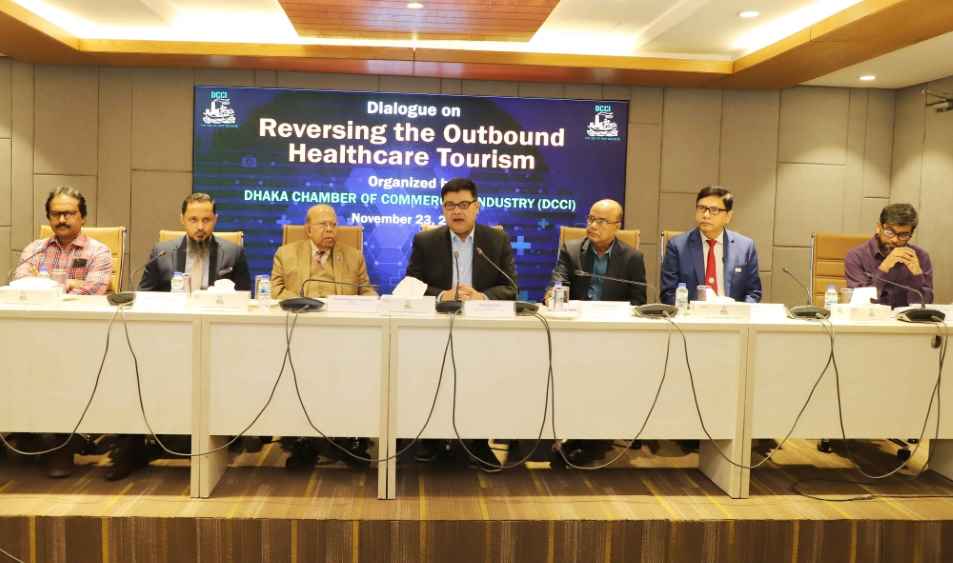
DCCI President Ashraf Ahmed in his opening remarks said that increasingly larger number of middle income households have been seeking healthcare services from abroad. While many of the treatments are available locally, the demand for medical tourism keeps growing unabated, he added. He also said except for few types of treatment available locally, such as robotic surgery, the key drivers of the trend are the relatively lower confidence and customers’ satisfaction. He further said, we need to remember, customer satisfaction comes not just from the treatment, but also the whole ecosystem, which is run by everyone in a hospital from nurses, administration, medical technologists. The DCCI President said the way to reversing the trend of outbound medical tourism is to outperform the regional competition; we need to be better in terms of quality of medical services, provide better customer satisfaction and most importantly be more reliable both in measurable index and branding. We need to be more open to foreign doctors, nurses, medical technologists and other specialists, Ashraf Ahmed opined. The trend is not caused by price differential, as travel and living expenses help foreign treatments insignificantly more expensive. He told these at a seminar on “Reversing the Outbound Healthcare Tourism” organized by Dhaka Chamber of Commerce & Industry (DCCI) on 23 November, 2024 held at DCCI Auditorium.
DCCI President Ashraf Ahmed in his opening remarks said, according to WTO data, 49% of the people in Bangladesh do not have access to quality healthcare, as well as the tendency to seek healthcare services abroad is increasing due to lack of international standards required in local market. The DCCI president also underscored the need for ensuring the use of advanced infrastructure and modern technology for the development of the country’s healthcare ecosystem, increasing budgetary support, launching the chain of international hospitals in Bangladesh, simplifying the registration process for foreign doctors and nurses to operate in Bangladesh, removing the procedural complexities of obtaining and renewing all types of licenses in the health sector and introducing digital system and providing tax exemption facilities to encourage private sector hospital operations in remote areas of the country.
DCCI Senior Vice President Malik Talha Ismail Bari presented the keynote paper. He said the budget in the health sector is not sufficient. In FY2024-25 allocation in the health sector was 30125 crore taka which is 3.78% of the total budget. Where per-capita health expenditure in South Asia is $401 in PPP but in Bangladesh it is only $110. In 2021, Bangladesh’s health expenditure as a share of GDP was 2.36%. The size of the overseas healthcare tourism from Bangladesh was recorded around USD 4 billion in 2012. Due to lack of specialized treatment, trust and perception, availability of advanced technology, competitively lower price local patients seek healthcare abroad. Among 36 specialized hospitals, 19 are located in the Dhaka District, while 17 are spread across the rest of the country. There are total 5,461 private hospitals and clinics in Bangladesh, of them, 1,810 are in the Dhaka division. And that is why; people of rural area are deprived of getting quality and adequate healthcare services that creates pressure on Dhaka. Limited infrastructure, skilled workforce, quality and safety concern, low doctor-patient ratio, long waiting time are some of the bottlenecks to accessing advanced healthcare in Bangladesh, he also added.
National Professor Dr. A K Azad Khan, President, Bangladesh Diabetic Samity said due to lack of facilities, trust and comfort, patients sometimes go abroad to have healthcare service. To reverse the outbound patients, we need to do a proper plan and identify the bottlenecks. Since, the medical science is an ever changing process as far as the technology is concerned; it will be changed in next 25 years than what we have now. So we need to have a proper curriculum to adopt the best technological advancement. He also stressed for standardization of labs, adequate budget allocation, facilitating more and more research and strengthening the BMDC.
Dr. Md. Liaquat Hossain, Registrar (Acting), Bangladesh Medical & Dental Council (BM&DC) said there is a national policy for registering foreign doctors but the process can be easier. Moreover, we have to give more effort on creating skilled professionals in this sector. In this regard Bangladesh needs international standard training institutes, he said.
Dr. Syed Abdul Hamid, Professor & Former Director, Institute of Health Economics, Dhaka University urged to establish a Medical Accreditation Council as soon as possible. He also demanded separate health cadres excluded from the civil services for operating only health administration efficiently. Moreover, he suggested to form a Health Service Commission like the Judiciary Service Commission to make this sector more functional.
Dr. Rezaul Karim Kazal, Professor, Department of Obstetrics & Gynecology, BSMMU said trust is a crucial factor for this sector’s development. We need to transform our healthcare to health care tourism. More and more quality Hospitals should be established in the rural area for wider coverage. Besides, in Bangladesh there is a shortage of trustee hospitals. Customized service is needed to entertain all groups of patients, he added.
Dr. Abul Bashar Md. Jamal, Professor of Surgery, Dhaka Medical College Hospital said that Bangladesh is a producer of medicines now and we also export in various countries, but in producing medical device, we are still lagging behind. To do better in this sector, we have to give focus on skilled manpower and training. In Bangladesh there are 134000 doctors and out which only 33 thousand are government doctors. But it is satisfactory that more than 10,000 foreign medical students are studying here in different public and private medical colleges.
Dr. Mir Saaduddin Ahmad, Secretary General, Bangladesh Society of Emergency Medicine said during Covid period, no one went abroad to take treatment. At that time we managed to handle the situation, it reflects our capability in the healthcare sector. He later stressed to grow emergency care platform with world class doctors and facility to build trust.



